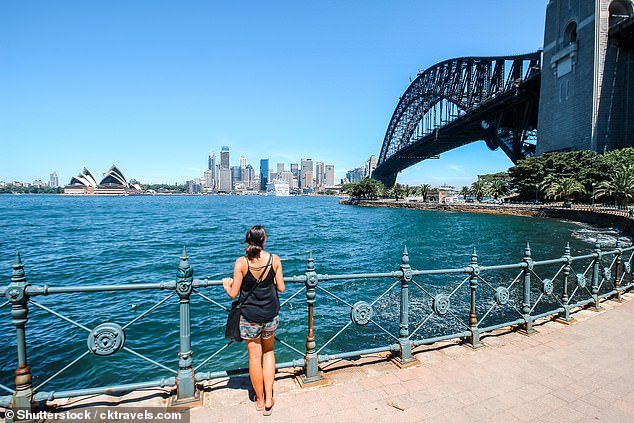They’re supposed to be the most connected generation in history, but young Australians, especially those in Sydney, are lonelier than ever before.
Far from the stereotype of Gen Z as a carefree, party-loving cohort, two in five are suffering from loneliness.
For some, that loneliness has been their unwelcome companion for years, and scrolling through TikTok and online forums, the proof is everywhere.
There are endless confessions from young Sydneysiders and travellers who’ve moved to the Harbour City saying they can’t make friends.
They struggle to break into social cliques, and often spend their weekends feeling alone in a city full of strangers.
Questions like ‘Is Sydney usually this lonely?’ dominate online forums, with overwhelming agreement on how hard it is to meet people.
On TikTok, expats have vlogged in droves about the isolation they feel in Sydney in particular.
And now a shocking new report from the University of Sydney has detailed the scale of the problem. A study led by Associate Professor Michelle Lim found that more than 40 per cent of Australians aged 15 to 25 are suffering from loneliness.

They’re supposed to be the most connected generation in history, but young Australians, especially those in Sydney, are lonelier than ever before

For some, that loneliness has been their unwelcome companion for years, and scrolling through Reddit or TikTok, the proof is everywhere
One in four are experiencing waves of it and one in seven have been feeling isolated for at least two years.
The research, conducted over seven months, used a mixed-method strategy, gathering information from two key areas to ensure definitive results.
‘The first was from data gathered from the Household, Income and Labour Dynamics in Australia (HILDA) survey, which is a representation of 15 to 25-year-olds across the country,’ Professor Lim told the Daily Mail.
‘The second was community participation… diving deeper and recruiting young people from across the country, including remote regional communities, LGBTQI+ and Indigenous Australians, to capture the diversity.’
The findings paint a troubling picture, and not just for mental health. Loneliness, especially when it’s persistent, can have serious knock-on effects on physical well-being too.
‘Loneliness and social isolation are bad partners in crime,’ Prof Lim said. However, they are not to be mistaken for the same thing.
‘Unlike the older generation, our young adults are socially very active, [but] they say they feel the loneliest within groups,’ she added.
Because of these worrying results, Professor Lim and other national experts are calling for urgent government action.

The study confirmed loneliness didn’t discriminate between genders or religions, but did list age and employment status as common ground. Traveller Amy (pictured) posted a TikTok about how alone she felt in Sydney: ‘This is the reality of moving across the world by yourself’
A crisis hiding in plain sight
Loneliness is not simply about being alone.
Prof Lim explained that it is a painful emotional state caused by a perceived gap between the relationships people have, and the ones they want.
And it doesn’t discriminate between genders or religions either, Prof Lim said – although age and employment status play a role.
‘Unemployed or non-working students were significantly lonelier than those who were working or had jobs,’ she said.
‘The cost of living is also a huge barrier to young adults being able to afford to socialise nowadays.’


Prof Lim stressed that seeing close friends less than once a month is putting this demographic at risk of persistent loneliness (pictured left TikTokker Fallon Duroy who posted a video about her struggle to make friends in Sydney and right, Heather Grace McGee)
Sydney is a sprawling, fast-paced city with one of the highest costs of living in the world.
Rent is through the roof, commutes can be long, and friendship groups are notoriously hard to penetrate.
The report found that young people were not spending enough quality time with their friends and family.
‘I think this is where we need to start prioritising connection time, [and] that frequency of seeing people,’ Prof Lim said.

Sydney has been singled out by expats as particularly hard for young people to live in. Rent is through the roof, commutes are long, and friendship groups are notoriously hard to penetrate
Prof Lim stressed that seeing close friends less than once a month is putting this demographic at risk of persistent loneliness.
‘We really need to see them more, to make the effort and create those opportunities,’ she added.
Another finding that took Prof Lim by surprise was related to young people’s relationship satisfaction with a parent.
‘It’s hard, because with that age group they pull away from their parents, and developmentally, their peers are more important,’ she said.
‘But we found that if they had a strong relationship with their parents and were satisfied with it, that really reduced the risk of persistent loneliness.’
Loneliness ‘leads to poor health’
Many associate this epidemic with just a social issue, but it is quickly evolving into a health one too.
In fact, chronic loneliness is linked to poor sleep, anxiety, depression, and weight gain, among other things.
The World Health Organisation (WHO) recently declared loneliness a global public health concern, and Australia is far from immune.
‘Mistakenly, policymakers assume that loneliness equals mental health,’ Prof Lim said.
‘What we’re saying is it’s separate and we need a point of intervention where we can really foster meaningful, healthy social connection before the onset of mental (illness).’
Through the findings, Lim noticed loneliness in this age group was very much tied to physical health.
‘If you look at physical health, you see early signs of vascular ageing in lonely young people, even before the onset of chronic disease,’ she said.
A national wake up call

In a shocking new report from the University of Sydney and led by Associate Professor Michelle Lim (pictured), found that more than 40 per cent of Australians aged 15 to 25 are suffering from loneliness
The University of Sydney report is now fuelling urgent calls for a national loneliness strategy, something other countries like the UK and Japan have already implemented with dedicated Ministers for Loneliness and publicly funded initiatives.
‘Opening another youth mental centre isn’t going to work,’ Prof Lim said.
‘What we’re saying is before that step, you can intervene much earlier. Let’s start in schools, families and workplaces.’
That means creating more inclusive community events, improving access to social activities in universities and workplaces, and investing in youth mental health services.
Some local councils and grassroots organisations have started to roll out free meet-up events and social programs aimed at tackling isolation, especially for young migrants and students. But funding remains patchy.
The report also calls for better education around loneliness to help young people recognise it, talk about it, and seek support early.









